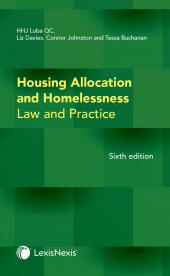Book review: Housing Allocation and Homelessness Law and Practice Sixth Edition

Housing Allocation and Homelessness Law and Practice sets out the legal obligations of local housing authorities when allocating social housing and assisting those who are homeless. Jennifer Phillips considers the sixth edition of the text, published earlier this year (January 2022).
Since the fifth edition of Homelessness and Housing Allocation, there have been key developments in the area of Housing Allocation and Homelessness, which have necessitated an update. The developments include the Homelessness Reduction Act 2018; The changes to the social security system in response to the 2020 coronavirus pandemic to support people through the crisis; The increased Universal Credit and Working Tax Credit; Changes made to Statutory Sick Pay, sickness and carer benefits.
In light of the changes to legislation, this book is timely and relevant. The book delivers on the title in that it extensively sets out in great detail the law pertaining to housing allocation and homelessness. In relation to actual practice I couldn’t help noticing that the author’s speciality is challenging social landlords and therefore some necessary perspective from local authorities and other social landlords may be missing.
- Chapter i provides a very good overview of the history of the legislation of housing allocation in England and Wales and the various stages from 1997 to date. This is important so that the user can appreciate the magnitude and challenge of housing allocation since the demand continues to exceed the supply. The developments have been varied and include ending the requirement to give preference to certain groups, the abolition of the housing registers and removing non-priority transfer applications in statutory arrangements.
- The description of Advisory Services and Homeless Assistance in Chapter viii details the relief for housing providers in that pro-active steps must be taken by applicants. The housing provider is required to make the information and assistance available. What can sometimes be described as the nebulous process of the application, consideration of eligibility and the determination is set out clearly. It details the challenge of the variety of applicants (including family members), the inquiries to be made, repeat applications inform as to the scope of the application process.
- The making of Inquiries and the actual Decisions set out in Chapter ix is key to sound housing allocation decision making and is set out clearly in the chapter. Again, input from a housing provider author would have been appropriate because of the uncertainty presented by the fact that housing authorities have a power but not a duty to make inquiries as to the local connection of the applicant and the limitations of the scope of the compulsory inquiries. The book highlights where there is little guidance on a particular area which is helpful. The challenge of the exercise of the PSED is pervasive in the process of homelessness and housing allocation, and therefore in my view, it could have been given a dedicated chapter. The importance and detail of the contents of the decision are helpfully detailed in this chapter. Again, input from a social landlord contributor would have provided more insight into the actual practice
- The position in relation to Eligibility and Assistance in Chapter xi is similar to that depicted in Chapter iii in relation to eligibility for allocation. The difficult considerations include determining immigration control status when the applicant was subject to immigration control and navigating EU Acts and regulations and Homelessness Acts and regulations. The challenge has not been assisted by Brexit, but the chapter provides good guidance on the provisions. However, it can’t escape mention of confusing aspects of the various provisions.
- Ascertaining whether the applicant became Homeless Intentionally in Chapter xiii, explores again the challenge of mandatory requirement, of making inquiries and the scope of the same. The chapter deals with it best by providing scenarios which are a helpful guide for practitioners.
- Chapter xx would have made a perfect end to the book since earlier chapters explored the strategies and steps of the housing allocation and homelessness process. It helpfully explores other provisions for providing help under the Localism Act, the Care Act, Nationality Immigration and Asylum Act 2002, the Mental Health Act 1983, National Health Service Act 2006 and the ECHR.
The strength of the book is the detail on the law and practice given. One of the main weaknesses of the book is the absence of a contribution from a social landlord to provide necessary insight into the interpretation and application of the statutory provisions and guidance in making strategies or decision making. The contribution of Counsel, who represents those distributing social housing and providing homelessness services, would have given a more balanced insight into the law and, most importantly, housing allocation and homelessness practice.
There is some duplication of information in the chapters, which, if presented more concisely, would result in a shorter, more composite resource book which would be user friendly for students as well as practitioners. Repetition, however, deepens the impression. It should be noted that many of the decisions are made by Housing Officers and not lawyers
The book is a must-have for all those providing a public housing and homelessness service (Local Authorities and Public and Private Registered Social Landlords). Most chapters provide the legislative and political context of each chapter so that there is clarity as to how we have arrived at the current legislations and codes of practice. In setting out the changes in interpretation of the legislations by the plethora of case law, the message is that housing providers have to remain nimble and agile enough to respond, give heed to regional and national changes and trends but deal with matters on a case by case basis.
Jennifer Phillips is a Principal Litigation Lawyer at Thanet District Council.
For further details or to purchase a copy, please click here.
If you would interested in reviewing books for Local Government Lawyer, please send your contact details and areas of interest to books@localgovernmentlawyer.co.uk

